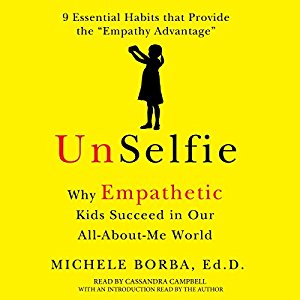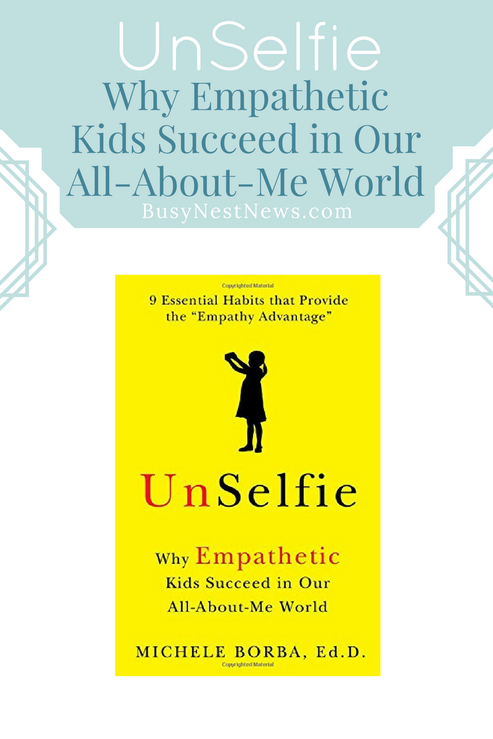|
By Brianna In which Brianna and Ariel discuss the pros and cons of the parenting book UnSelfie, which touts "9 Essential Habits that Provide the Empathy Advantage." Should you read this book? Could being kind really help your kid get ahead? Or is it so much touchy-feely fluff? Read on to find the answers. If you decide you'd like to purchase this book, the links in this article are affiliate links. Buying this book will result in a payout to us, which helps keep Busy Nest News going. Thanks! UnSelfie: Why Empathetic Kids Succeed in Our All-About-Me World, by Michel Borba, Ed. D.Summary: UnSelfieIs it possible to succeed by placing empathy over competition? Should parents emphasize kindness over achievement to their children? Is it possible for anyone to become more empathetic than they already are? According to Dr. Michele Borba, the answer to all of these questions is a resounding “yes!” In her book, UnSelfie, Dr. Borba outlines the evidence that supports kindness over competition as the key to success, and she gives parents and educators tools to make their children more empathetic. Review: UnSelfie We’ve reviewed a handful of parenting books at this point. Sometimes they are an absolute delight to read, stimulating my sense of humor or of motivation. Sometimes they’re tough to get through. Sometimes they’re hard to read, because I disagree with the premise of the arguments they contain. Sometimes they’re hard to read, because they contain truths that are painful to hear on one or more levels. This book belongs to the final category. I was taught to be polite. But Dr. Borba’s book made me realize that I’m one of those kids who was not explicitly instructed to be kind. That was tough to hear, and it made me keep this book at arm’s length for a while. I mean, all of this conflict resolution, “just hear the other side out” stuff was seen as a bit silly and superfluous by my parents and my friends’ parents. At least, that’s how I perceived it at the time. Dr. Borba makes an excellent case for the “Empathy Advantage,” and for preventing our children from being swept up in the “selfie culture.” She explains that kids with the Empathy Advantage- UnSelfies- “are better adjusted, more popular, and even have healthier peer relationships.” Who wouldn’t want those wonderful things for their kid? So, with more effort than I’m proud of, I actively set aside my preconceived notions about how crucial kindness is for future success, and I finished this book. I’m glad that I did, and I might have to get it in print (I listened to the audiobook version of it) so that I can make notes and cheat sheets. Throughout UnSelfie, Dr. Borba offers many practical suggestions that anyone can implement to exercise empathy in themselves and their children. She also provides lists of books for parents and children to help on the road to becoming more kind. While I’m eager to read some of the nonfiction on her lists, I was dismayed to find that I’ve not only read the vast majority of the fiction books she recommends, but I actively dislike them! That’s partly a matter of taste, the books are all well-known and liked by (apparently) everyone else. But maybe I didn’t like Because of Winn Dixie because I wasn’t kind enough yet. In reading (listening to) this book, I really appreciated that Dr. Borba took a topic- empathy- which I thought was entirely subjective, and made it concretely objective and scientific for me. It is not theoretical that kind people will do better over the long run than people who are not especially kind. We know from a previous book (Mindset, by Dr. Carol Dweck) that nearly anything is a skill that can be learned, and Dr. Borba echoed that sentiment in UnSelfie, as well. Empathy can be exercised and strengthened in anyone, and there are influences around us pushing us to be more or less kind from one moment to the next. By self-regulating our emotions, we can transform ourselves into the kind, powerful change-makers we want our children to look up to and ultimately become. I give UnSelfie four eggs. It is a book full of valuable information, great examples, and actionable tips. That said, it was tough to get through, and I felt like Dr. Borba was a little on the attack at times. Not a ton, but enough to make me even more uncomfortable than the realization that I’m not Super Nice already had. Also, my verdict on the audiobook is that it is a great format in which to experience this work. The original was not so full of figures that it became impossible to follow, which can happen in similar books. The reader, Cassandra Campbell, was an ideal choice and a pleasure to listen to. Discussion: UnSelfieBrianna: So, Ariel, did this book make you confront yourself the way I had to? Did you ever feel uncomfortable, or skeptical of what Dr. Borba had to say? If so, was it a bad thing? Ariel: Oh most definitely. UnSelfie forces you to confront some painful truths. For me it was patting myself on the back for being more kind than I thought one second, and then coming to grips with how self-centered I really am in the next. Reading it was an exercise in self-reflection. If for nothing else, I would recommend UnSelfie as a exploration into yourself, because as parents and caregivers we are our most influential tool in shaping our youth. The more we know ourselves, the more effective we can be. What made me skeptical was Borba’s cliched take on screen time. For her it boils down to the more screen time a child is allowed, the less empathetic they will be. But its seems to me as if this just trumpets current mainstream attitude without delving into the deeper whys and hows. It is more nuanced than that. In a previous book we have read (There’s No Such Thing as Bad Weather), Linda Åkeson McGurk points to studies that suggest not all screen time is created equal. When screens are the medium for relationship building, such as playing a game together on a tablet or actively watching a movie together, (maybe even one of the movies Borba suggests for teaching emotion recognition) they are not associated with the negatives effects we are all so familiar with. To me this suggests that it is not the screen time that hinders empathy, but how screen time usually takes away from time spent interacting with others. Brianna: I couldn’t agree more. There were a few subjects that Borba treated with, to me, uncomfortably broad brushstrokes. The screen time problem was one. Another was the complete rejection of competition being good for kids’ development. In the 90s we were told that competitive sports taught children the importance of winning and losing with grace, that hard work results in achievement, and to take pride in their accomplishments. While we’re all familiar with the unhealthy manifestations of competition in children’s activities (rude parents, cheating, bullying), I find it hard to believe that all competitive activities are completely devoid of the benefits I listed above. And what about competing within the context of team sports and activities (such as science olympiads or robotics competitions)? Could this not allow a child to reap the benefits of cooperation and competition simultaneously? Even solo activities are often done in the context of a team; martial arts, track and field, gymnastics, swimming, and dance, to name a few. All of these tout discipline and self-regulation as the virtues they instill. Borba rather vehemently dismissed all competition, telling us that educators and parenting experts were wrong to encourage it the last few decades, without addressing the very real reasons they had for doing so in the first place. Isn’t there room for children to learn empathy and cooperation, as well as accepting defeat when they don’t get that scholarship/internship/job? Ariel: There must be. There has to be. One book on empathy is not going to rework the world. Competition is a part of life, by wilfully ignoring that reality we are setting our kids up for failure. Despite these issues, Borba convinced me that empathy is essential for my child's success. I really appreciated that she provided concrete ways that we can build empathy in kids of all age groups. Have you begun putting any of her suggestions into practice? Brianna: I have, in fact, been finding easy ways to emphasize empathy to my little Monkey. If she hits Dog or does anything else that is rude, I say “that was not a nice thing to do. I expect you to be kind.” I’ve also started incorporating kindness and helpfulness into her identity by saying “You’re the kind of person who likes to help!” whenever she does something helpful. Adorably, the first time I said that, she replied with “Yeah, I do!” She already is seeing herself as kind and helpful. Obviously I can’t just coast on this; it’s going to be an ongoing exercise to encourage kindness in her for the rest of her childhood. Are there any tips you’re using or looking forward to using as Bean gets older? Ariel: I was grinning ear to ear when Borba revealed that literature can help develop our moral imagination. Another excuse to read to Bean?! One suggestion that I am looking forward to implementing is founding a book club. My mother and I were involved in a mother-daughter group when I was young and I loved it. I hope that I create a similar experience for Bean. When it comes to helping our children see themselves as empathetic, Borba suggests creating a family motto based on your core values, such as “Our family steps in to help,” or “Our purpose is to care.” Or their own personal mantra that they can repeat when faced with tough decisions, such as “I reach out to help others,” or “I know it’s nice to be nice.” I cannot wait to turn our family core values into artistic creations worthy of display! Brianna: Those are exciting suggestions! I think it’s safe to conclude that we took a lot away from this book. In terms of evidence that made us reassess the the importance of empathy in our kids’ success, and in terms of practical steps to assure development in this direction, UnSelfie really does deliver. The reasons we agree on giving it four eggs instead of five are that Dr. Borba speaks a little too broadly to some topics we believed to be much more nuanced, and it just isn’t quite as fun to read as our favorites. That said, at four eggs it really is a good and important read for any parent. Let's keep in touch
0 Comments
Leave a Reply. |
AuthorsAriel and Brianna are friends who met while working in a library. Now they collaborate to develop life-enhancing book club experiences. Archives
June 2023
Let's keep in touch!Categories
All
|










 RSS Feed
RSS Feed